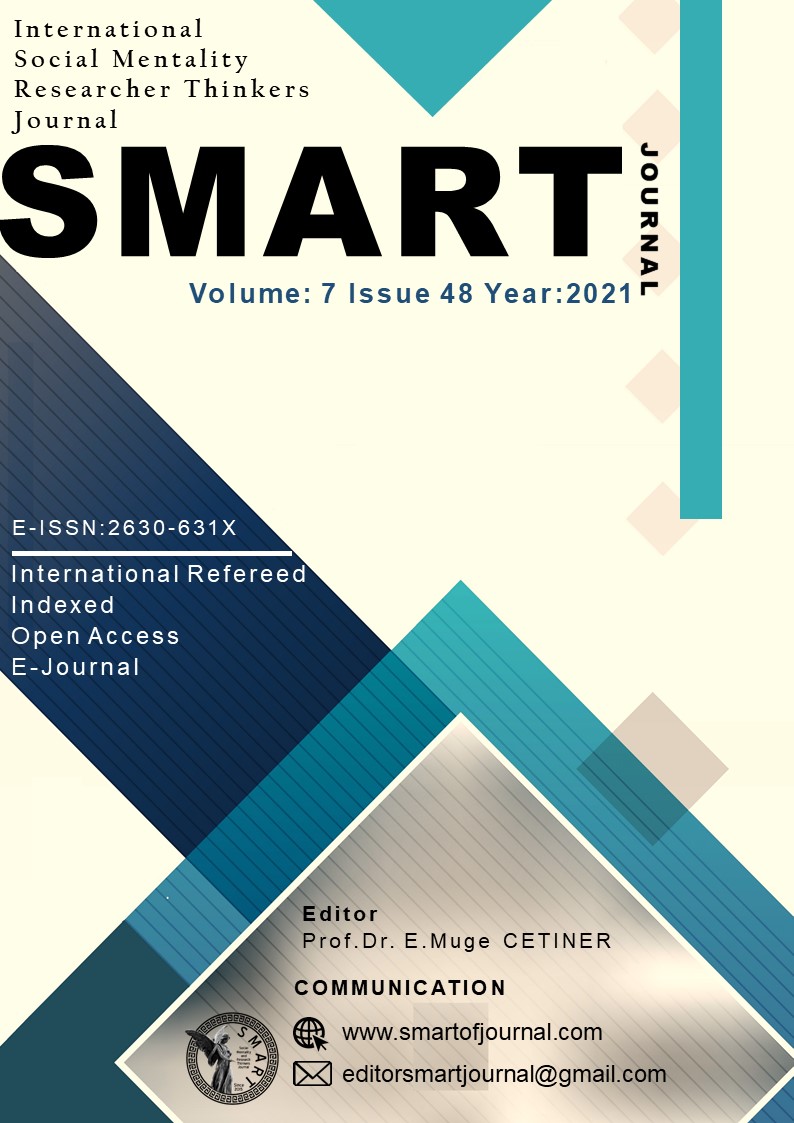OPINIONS OF SCIENCE TEACHERS TO COMMUNICATE WITH PARENTS IN THE DISTANCE EDUCATION PROCESS: USE OF WHATSAPP APPLICATION
Author :
Abstract
Bu araştırma, fen bilimleri öğretmenlerinin uzaktan eğitim sürecinde ebeveynlerle iletişimde WhatsApp kullanımına ilişkin görüşlerini belirlemeyi amaçlamaktadır. Araştırma nitel araştırma desenlerinden fenomenoloji çalışması olarak gerçekleştirilmiştir. 2020-2021 eğitim öğretim yılında Kayseri'de görev yapan ve ebeveynlerle WhatsApp gruplarını kullanarak iletişim kuran 21 fen bilgisi öğretmeni araştırmanın çalışma grubunu oluşturmuştur. Veri toplama aracı olarak WhatsApp uygulamasının ebeveynlerle iletişim kurmada kullanılabilirliğine ilişkin öğretmenlerin görüşlerini belirlemek amacıyla araştırmacı tarafından geliştirilen görüşme formu kullanılmıştır. Verilerin analizinde görüşme formuna verilen cevaplar içerik analizine tabi tutulmuştur. Analiz sonucunda fen bilimleri öğretmenlerinin ebeveynlerle iletişimde WhatsApp gruplarının kullanımına, paylaşılan gönderilere, geri bildirim hızına, paylaşım saatlerine, avantajlarına, bu avantajların faydalı kullanımına yönelik önerilere, dezavantajları, bu dezavantajları ortadan kaldırmak için alınabilecek önlemlere ve öğretmenlerin kullandığı diğer iletişim araçlarına ilişkin görüşleri ışığında dikkat çekici sonuçlar elde edilmiştir.. Çalışmanın sonunda ebeveynlere ve öğretmenlere yönelik öneriler sunulmuştur.
Keywords
Abstract
This study aims to determine the opinions of science teachers regarding the use of WhatsApp to communicate with parents during the distance education process. The study was carried out as a phenomenology study, one of the qualitative research designs. 21 science teachers working in Kayseri in the 2020-2021 academic year and using WhatsApp groups to communicate with parents constituted the study group of the study. The interview form developed by the researcher to determine the opinions of the teachers on the usability of the WhatsApp application to communicate with parents was used as a data collection tool. In the analysis of the data, the answers to the interview form were subjected to content analysis. As a result of the analysis, remarkable results were obtained in the light of the opinions of science teachers regarding the use of WhatsApp groups in communicating with parents, shared posts, feedback speed, sharing hours, advantages, recommendations for beneficial use of these advantages, disadvantages, measures that can be taken to eliminate these disadvantages, and other means of communication used by teachers. At the end of the study, suggestions for parents and teachers were presented.
Keywords
- Atabey, D., & Tezel-Şahin, F. (2011). Aile öğretmen iletişim ve işbirliği ölçeği. Kastamonu Eğitim Dergisi,
- Atabey, D., & Tezel-Şahin, F. (2011). Aile öğretmen iletişim ve işbirliği ölçeği. Kastamonu Eğitim Dergisi, 9(3), 793-804.
- Bak, G., Bak, Ö., Eşidir, O. V. ve Bak, A. (2018). Öğrenci velilerinin whatsapp guruplarinin oluşturulmasikonusundaki görüş ve önerilerinin incelenmesi, Social Mentality and Research Thinkers Journal, 4(14), 1100-1109.
- Balcı, A., & Tezel Şahin, F. (2018). Öğretmen-aile iletişiminde WhatsApp uygulamasının kullanımı. Gazi Üniversitesi Gazi Eğitim Fakültesi Dergisi, 38(2), 751-778.
- Bouhnik, D., Deshen, M., & Gan, R. (2014). WhatsApp goes to school: Mobile instant messaging between teachers and students. Journal of Information Technology Education: Research, 13(1), 217-231.
- Bozdemir Yüzbaşıoğlu, H., Candan Helvacı, S., Ezberci Çevik, E., & Kurnaz, M. A. (2020). Examinationsof the conversation in whatsapp group created for communication in a bachelors’ level astronomy course. International Journal of Education in Mathematics, Science and Technology (IJEMST), 8(2), 167-176.
- Büyüköztürk, Ş., Kılıç Çakmak, E., Akgün, Ö.E., Karadeniz, Ş., & Demirel, F. (2009). Bilimsel araştırma yöntemleri. Ankara: Pegem Yayınları.
- Creswell, J. W. (2009). Research design, qualitative, quantitative, and mixed methods approaches (Third Edition). California: SAGE Publications.
- Epstein, J. L. & Sheldon B S. (2002). Improving student behavior and school discipline with community and family involvement. Education and Urban Society, 35, 4-26.
- Erdem, C., & Avcı, F. (2020). Okul öncesi eğitimde aile katılımının sağlanması için bilgi iletişimteknolojilerin kullanımı: WhatsApp uygulaması örneği. Başkent Üniversitesi Eğitim Fakültesi Dergisi. 7(2),Haşıloğlu, M. A., Durak, S., & Arslan, A. (2020). Covid-19 uzaktan eğitim sürecinde fen bilimleri şuberehber öğretmenlerinin gözünden öğretmen, öğrenci ve velilerin değerlendirilmesi. Uluslararası Eğitim Bilim ve Teknoloji Dergisi, 6(3), 214-239.
- Ho, L., Hung, C., & Chen, H. (2013). Using theoretical models to examine the acceptance behavior of mobile phone messaging to enhance parent–teacher interactions. Computers & Education, 61, 105-114.
- Karasar, N. (2009). Bilimsel araştirma yöntemi, (20. Baskı). Nobel Yayın Dağıtım: Ankara.
- Keith, T. Z., Keith, P. B., Troutman, G. M., Bickley, P., Trivette, P. S., & Singh, K. (1993). Does parentalinvolvement affect eighth grade student achievement? Structural analysis of national data. School Psychology Review, 22, 474-496.
- Miles, M, B.,& Huberman, A. M. (1994). Qualitative data analysis: An expanded Sourcebook. (2nd ed). Thousand Oaks, CA: Sage.
- Özbay, Ö. (2015). Dünya’da ve Türkiye’de uzaktan eğitimin güncel durumu. Uluslararası Eğitim Bilimleri Dergisi, 2(5), 376-394.
- Ruksasuk, N. (1999). Library and information science distance education in Thailand in the next decade. In 65th IFLA Council and General Conference, Bangkok, Thailand, 20 - 28 Aug, 1999.
- Sönmez, M., Yıldırım, K. & Çetinkaya, F. Ç. (2020). Yeni tip Koronavirüs (SARS-CoV2) salgınına bağlıuzaktan eğitim sürecinin sınıf öğretmenlerinin görüşleriyle değerlendirilmesi. Turkish Studies, 15(6), 855- 875.
- Statista. (2019). Number of Mobile Phone Users Worldwide from 2015 to 2020 (in Billions). Accessed 03.05.2021. https://www.statista.com/statistics/274774/forecast-of-mobilephone-users-worldwide/
- Tuncer, N. (2021). Aileler ve öğretmenler arasindaki iletişim için güncel bir uygulama: WhatsApp grubu örneği. Trakya Eğitim Dergisi, 11(2), 1037-1063.
- UNESCO (2021). Education: From disruption to recovery. Accessed 03.05.2021. https://en.unesco.org/covid19/educationresponse
- Wahyuni, S., & Febianti, K. (2019). The use of WhatsApp group discussion to improve students’ writing achievement. Indonesian Educational Administration and Leadership Journal, 1(1), 45-51.
- Yazıcı, T. (2015). Kişiler arası iletişimde anlık mesajlaşma uygulamasının yeri: WhatsApp uygulaması ileilgili üniversite öğrencileri üzerine bir inceleme. International Journal of Social Sciences and Education Research, 1(4), 1102-1119.
- Yıldırım, A., & Şimşek, H. (2013). Sosyal bilimlerde nitel araştırma yöntemleri. Seçkin Yayıncılık





